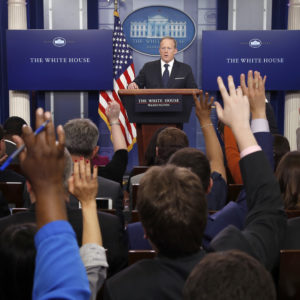Editor’s Note: For an alternative viewpoint, please see: Counterpoint: Liberal Bias Has Reached Disturbing New Heights
A window to the world. That’s what it’s been said journalists provide.
In a sense, it’s absolutely true. We have a front-row seat to history. We listen, we watch, we question, we try to understand. Most important, we share.
We share what we see, what we learn, what we discover. And we share it with you.
No two windows are identical, however. Windows come in different shapes, sizes, tints and materials. Also, no two windows can offer the exact same view.
Similarly, no two journalists offer identical accounts of the same event. Each varies in experiences, histories, cultures and perspectives. Those variations don’t mean journalists report skewed views of the world though.
As humans, each of us can walk away from watching an event or hearing a speech, with slightly (sometimes very) different perspectives. The same goes for an experience.
Why? Each of us has had our own individual experiences, shaping how we see, react and interpret the world around us.
Journalists are no different.
So, is a person inherently biased based on their experiences, history and learned reactions?
I think the answer could be yes. A lot of people agree humans are inherently biased.
So, let’s apply this to a journalist. I think — and certainly hope — we can agree the public has a right to information, to know what is happening around them. It’s a journalist’s role to fill that need and that right.
Sometimes that role is easy. We have straight facts, nobody disputes them, and we report them that way.
Most of the time it’s more complicated. Very rarely are the facts cleanly laid out. Even rarer: all sides agreeing with what is being said. Add complications, like not having access to speak to individuals involved in the story, not having complete access to all of the facts, and telling a complete story including every detail is harder than it looks.
I’m not making excuses for journalists or complaining about the job. Having a front-row seat to history, working in a profession that is specifically mentioned in the U.S. Constitution is something that brings joy, a sense of purpose and — most important — responsibility.
As humans, we may inherently be biased, but as journalists, we learn to recognize those biases, make them known to ourselves, our editors and our newsrooms. We discuss those biases. We go out of the way, once we recognize a bias, to find those who have a different perspective. We learn to leave our opinions out of stories, and if we can’t, we let another journalist who can to tell the story.
The Society of Professional Journalists has a Code of Ethics. It’s one of the most widely used in the journalism profession. It discusses being transparent, seeking truth and being accurate, minimizing harm and holding ourselves accountable.
There are times when a journalist’s view and perspective and not just facts are absolutely needed. In order to gather facts and tell stories, we gain access to places people may not be able to get access. In these cases it’s very much up to the journalist to add context to what is happening; describe for the viewer what they’re seeing and experiencing. Is the crowd agitated? Are the people hopeful, angry, excited? In breaking and quickly developing stories this perspective can be very helpful and important.
I wish I could bring every person who tells me “the media” is biased into my newsroom for our daily morning meetings. It’s how we start the day, each and every day. We pitch story ideas and discuss them in detail: who should we talk to, why is this important, do people care, what would this group say about the story? Sometimes the meetings are long, but they’re needed. Every day we try to make sure we are cutting through our biases, throwing our personal worldview upside down, so we can tell the most accurate truth in the context of the present facts.
My current newsroom is not unlike the rest around the country. These are common discussions that SPJ and other journalism groups encourage in newsrooms.
Journalists not only provide a window to the world, they provide many windows to the world. Each may vary from another, but ethical and responsible journalists will make sure people get the most accurate view possible.

